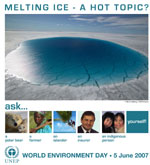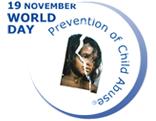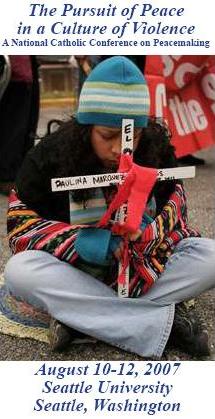Announcements
JUNE 5, 2007
WORLD ENVIRONMENT DAY

Melting Ice: A Hot Topic?
Meltdown Poster
Sponsored by UNEP
NOVEMBER 19, 2007
CHILD ABUSE PREVENTION DAY

Women's World Summit Foundation
Sponsored by WWSF
SCIENCE, POLICY, AND ENVIRONMENT
Sponsored by the National Council for Science and the Environment (NCSE). January 16-18, 2008. Washington Convention Center, 801 Mount Vernon Place, N.W., Washington, DC 20001. Focus on Climate Change: Science and Solutions Resources. Please direct questions on NCSE's next conference to NCSE 2008 Conference on Climate Change.
GENDER AND WELL-BEING
A symposium on "Gender and Well Being: The Role of Institutions from Past to Present." Madrid, Spain, 25th-27th June 2008. From the CFP: "There are fundamental questions about the origins and nature of individual and social well-being in Europe, as well as on its sustainability. The symposium's aim to develop a new concept of well-being, examining the socially gendered indicators, actors and processes affecting the production and access to well-being across the life-course. This reflexion is meant to be conducted at a crossroads between history, social science and economy." Call for papers opened till 20th September 2007.
Send abstracts to Paloma de Villota with copy to the
Secretary by this Form. Selection of abstracts will be made by the end of October 2007 and will be communicated to authors before 15th November 2007. Papers must be sent by e-mail no later than 26th May, 2008.
CHALLENGING THE CULTURE OF DEATH
The aim is a cross-cultural dialogue imagining a political and symbolic world based on life not death: mercy not sacrifice.
"A multi-disciplinary event, we aim to bring diverse approaches to our deliberations under the following headings: Theory, Resistance, and Theology. Priority will be given to those taking a multi-disciplinary synchronic perspective, and imaginative approaches to presenting that maximize pre-event preparation (making papers available in advance) and interactive modes of engagement with participants. We also hope to balance incisive critique with concrete strategies for practical action." Venue: Trinity College, Dublin. Date: 2-4 November 2007. Sponsors: Institute for Feminism and Religion and Centre for Gender and Women’s Studies, Trinity College, Dublin. Please address questions to Mary Condren.
TACTICS OF RESISTANCE
Call for Papers on Tactics of Resistance: Limitations & Possibilities for an interdisciplinary graduate conference to be hosted by the Centre for the Study of Theory and Criticism, University of Western Ontario, Canada,
October 12-13, 2007. "We are looking for papers addressing alternative conceptions and frameworks of resistance, and their potential for revolutionary change. We welcome students, professors, artists and activists to re-think resistance through an interdisciplinary alliance." For more information, email the Centre for the Study of Theory and Criticism.
PEACEFUL COEXISTENCE
International Conference on Peaceful Coexistence, Erasmus University Rotterdam, The Netherlands, 23–24 November 2007. The need for peaceful co-existence between Muslims and non-Muslims within and between nations has long been recognized. The much publicized failures in relations in recent years, which are both a cause and effect of the situation in many parts of the world – not just the Middle East – should spur all right-minded people to re-double their efforts to sustain the hope for peaceful co-existence. For further information please e-mail: Peaceful Coexistence or visit the Peaceful Coexistence Conference web site.
FORMATION OF NEW PUBLICS
Religion has the capacity to form intentional groups and communities as well as to mobilize agents to work for certain goals. This formation of communities and mobilization of resources to achieve goals is actually consonant with the term "formation of publics" as used by C. Wright Mills. This conference will explore the new publics of the 21st century. Publics here may be individuals and/or groups who attempt to create knowledge and/or achieve certain actions using religious ideals, beliefs, and/or symbols. Venue: University of Santo Tomas, Manila. Date: 23-26 January 2008. Deadline for abstracts: 21 July 2007. Enquiries: Esmeralda Sanchez.
PUBLIC KNOWLEDGE
An international symposium organised in collaboration between the Centre for Research on Socio-Cultural Change (CRESC) and Social Anthropology at the University of Manchester. Dates: 28 & 29 June 2007. For more information see the symposium website. Point of contact: Alberto Corsín Jiménez.
LAW, RELIGION, CULTURE
Lancaster University, Friday 14th September 2007. This call for papers encourages the submission of diverse abstracts engaging with issues surrounding Law, Religion and Culture and aims to facilitate the following: a forum for setting an agenda within the broad field of Law, Religion and Culture; exploring the construction of the concept of religion and the religious subject; the implications of such constructions and concepts for the law; furthering emergent interdisciplinary dialogue. Please send abstracts of 250 words maximum from a wide range disciplines and a diversity of perspectives to: Dr. Sarah Beresford or Dr. Ian Bryan .
LAW, RELIGION, CULTURE
Lancaster University, Friday 14th September 2007. This call for papers encourages the submission of diverse abstracts engaging with issues surrounding Law, Religion and Culture and aims to facilitate the following: a forum for setting an agenda within the broad field of Law, Religion and Culture; exploring the construction of the concept of religion and the religious subject; the implications of such constructions and concepts for the law; furthering emergent interdisciplinary dialogue. Please send abstracts of 250 words maximum from a wide range disciplines and a diversity of perspectives to: Dr. Sarah Beresford or Dr. Ian Bryan .
BIOLOGY AND RELIGIOUS BEHAVIOR
Call for Papers: "The Biology of Religious Behavior: A Human Ethology Perspective on Religion." Care to spend time in Italy studying psychology and religion? Then consider submitting a paper to the International Society for Human Ethology meeting in Bologna, Italy, July 14-18, 2008. Better yet, there is a possibility for funds to support your travel to Bologna for the conference. Sposored by the Society of Human Ethology. Bologna, Italy, 14 – 18 July, 2008. The deadline for abstract submission is 1 March 2008. For more information visit the ISHE2008 conference website. Points of contact are Marco Costa, University of Bologna, Italy and Luca Tommasi, University of Chieti, Italy. See also the PsyRel blog of Jay Feierman.
![[pedofilia]](pedofilia.jpg)
WOMEN & PUBLIC LIFE
Women & Public Life: Empowerment & Participation in Social Studies & Research, July 2007. A round-table to be jointly organized by the Middle East Research Competition (MERC) program in Tunis and the Organization of Arab Women in Cairo. The seminar scheduled for July 2007 in Syria falls within a topic of interest to the two organizations, focusing on research in the area of empowerment of Arab women in the public sphere. For more information write to: Please write to, Organization of Arab Women, Cairo or MERC, Tunis.
EU GENDER EQUALITY
An expert meeting on gender equality in the enlarged European Union is underway (between July 2006 and September 2007) as part of a current research project on gender equality in the enlarged EU. It is being carried out as a cooperation between Social Change and the Institute of East-European History. The aim is to examine the possibilities, chances and obstacles for the future gender equality policy on the EU level. The discussion in this interdisciplinary and transnational forum will focus on the implementation of the EU’s gender equality regulations, on independent national policies, on the history and role of the women’s (rights) movement and the current situation of women, especially in the new member countries Slovenia, Czech Republic, Hungary and Bulgaria, but also in the "old" member states like Germany, France, and Austria. Points of contact: Petra Ziegler and Verena Kaselitz at the Institut für Osteuropäische Geschichte der Universität Wien, Social Change Institut für Innovation in der Genderforschung und Gewaltprävention.
REPRODUCTIVE & SEXUAL HEALTH
The 4th Asia Pacific Conference on Reproductive and Sexual Health and Rights will take place 29th to 31st October 2007, Hyderabad, India. The conference will provide a platform for people with diverse perspectives, expertise and experience to exchange ideas, discuss and debate issues of concern, and learn from each other about sexual and reproductive health and rights, with specific reference to the implementation of the Programme of Action of the International Conference on Population and Development (ICPD, 1994). The theme of the Conference is "Exploring New Frontiers in Sexual and Reproductive Health and Rights". For more information, please visit our website, 4APCRSH.
GLOBAL SOCIAL JUSTICE
At the Centre for the Study of Global Ethics & Department of Political Science and International Studies, University of Birmingham, 3 - 5 September 2007. Call For Papers: Abstracts are encouraged from activists, practitioners and policy-makers as well as from academics from relevant fields (including cultural studies, sociology, politics, philosophy, law, history, religious studies and history). Graduate submissions encouraged and integrated fully into the programme. Abstracts should be no more than 500 words and be emailed by 15 June 2007 to Nicki Smith or Heather Widdows. For more information visit the conference website and the website of the Global Studies Association (GSA).
GLOBAL VALUE CHAINS
Annual Symposium on Globalization, Global Value Chains and Global Production Networks, 6-7 June 2007 at the University of Sussex. This event is sponsored by the Economic Geography Research Group (EGRG) at the University of Sussex. EGRG research activities are related to the Institute of Development Studies (IDS), the Sussex European Institute (SEI), and the Centre for Global Political Economy (CGPE). Anyone who wishes to attend on either or both days is welcome to do so, but should email Mick Dunford to be added to the list of participants.
PEACE IN A CULTURE OF VIOLENCE
From the announcement: "Pax Christi USA is pleased to announce this year's conference, The Pursuit of Peace in a Culture of Violence: A National Catholic Conference on Peacemaking, to be held August 10-12, 2007, at Seattle University in Seattle, WA. The conference is being co-sponsored by Seattle University's Department of Theology and Religious Studies, the Office of the Vice President for Mission and Ministry, and the Graduate School of Theology and Ministry." The announcement is posted in the conference website, with links to detailed conference information. There is also a very informative conference brochure.

POLITICS OF HUMAN TRAFFICKING
CFP by the St. Antony's International Review (STAIR), a peer-reviewed academic journal of international affairs based here at St. Antony's College, University of Oxford. A forthcoming issue of STAIR will focus on the theme of human trafficking. Abstracts due August 30, 2007. Papers due December 30, 2007. A copy of the CFP and other information can be obtained via email to Ms. Heidi Stöckl, Associate Editor, St. Antony's International Review (STAIR).
VIOLENCE IN CLINICAL PSYCHIATRY
This will be the 5th European Congress on Violence in Clinical Psychiatry. Congress theme: "Best Evidence Based Practices on
Prevention, Treatment and Management of Violence at the Individual, Institutional and Governmental Level." 25 - 27 October 2007, 0, Amsterdam. From the invitation: "Violent and aggressive behaviour is a complex phenomenon of great importance in society as well in clinical psychiatry. Violence has become a global problem crossing borders, work settings and occupational groups. Within clinical psychiatry, violence is one of the major obstacles for effective treatment and rehabilitation, and with regard to health care workers, violence is the major occupational health hazard. Therefore a comprehensive institutional approach to this problem at all organizational levels is needed." See the conference website. Point of contact: Nico Oud.
DIGITAL EARTH (ISDE5)
Digital Earth is a visionary concept, popularized by former US Vice President Al Gore, for the virtual and 3-D representation of the Earth that is spatially referenced and interconnected with digital knowledge archives from around the planet with vast amounts of scientific, natural, and cultural information to describe and understand the Earth, its systems, and human activities. Join world-class representatives from industry, academia, government, and NGOs in an unparalleled exploration and exposition into the future of Digital Earth at the ISDE5 from June 5-9, 2007, on the campus of the University of California at Berkeley. Online registration: ISDE5. More info: Dr.DigitalEarth.
GENDER RESEARCH NETWORK
The Gender Research Network in the School of Social Sciences, University of Manchester is pleased to invite you to our launch conference on the theme Engendering Policy and Politics: International and comparative themes and issues, to be held at the University of Manchester, 21st-22nd June 2007. Please see the conference website for details. The point of contact is Dr. Kirstein Rummery.
ECEM 2007
The 6th European Conference on Ecological Modelling, ECEM'07, "Challenges for ecological modelling in a changing world: Global Changes,
Sustainability and Ecosystem Based Management" will be held in Trieste, Italy, on November 27-30, 2007. Particular attention will be devoted to themes related to Global Changes, Sustainability and Ecosystem Management. ECEM'07, however, will cover ALL topics in the area of ecological modelling and participants are invited from ALL areas of research, development and application of ecological models. The abstract submission process will close on May 31, 2007. Point of contact: ECEM'07 secretariat.
WIKISYM 2007
The 2007 International Symposium on Wikis. October 21-23, 2007, Montreal, Canada. The theme this year is "Wikis at Work in the World: Open, Organic, Participatory Media for the 21st Century." For more information see WIKIMANIAS. Questions should be directed respectively at papers@wikisym.org (research papers and practitioner reports), workshopsandpanels@wikisym.org (workshops and panels), or demosandposters@wikisym.org (posters and demos).
EDUCATION FOR PEACE 2007
Announcing the First International Education for Peace Conference-2007: Strategies for Building a Civilization of Peace at Granville Island in Vancouver, B.C., Canada (14-17 November 2007). The primary goal of the conference is to contribute to the worldwide efforts to create a civilization of peace. Essential to this undertaking is life-long peace education at home, in schools, and in the community, with its focus on the integral role of all members of society-children, youth, and adults-and with the equal participation of women and men in the administration of human affairs. Point of contact: Stacey Makortoff.
VULNERABILITY AND TOLERANCE
Blaise Pascal Instituut, Amsterdam Vrije Universiteit July, 4-8, 2007. This is the annual meeting of the Colloquium on Violence and Religion, a scholarly society focused on the exploration, criticism, and development of René Girard's Mimetic Theory. See the conference website for subthemes, deadlines for abstracts, etc. For more information, contact Thérèse Onderdenwijngaard.
20TH WORLD ENERGY CONGRESS
11 Nov 2007 - 15 Nov 2007, Rome, Italy. The World Energy Congress is the most authoritative international energy meeting held by the World Energy Council (WEC) every three years. Papers and posters are accepted in either of the WEC official languages: English or French. Deadlines: Submission of papers and posters: from 1st June 2006 to 31st December 2006. Notification of acceptance: by 31st May 2007. Contact: Organising Secretariat
PLURALITY AND REPRESENTATION
the 2007 conference of the European Association for the Study of Religions (EASR) will take place at the University of Bremen, Germany, September 23-27. It will be a joint conference of the EASR and the DVRW (Deutsche Vereinigung für Religionswissenschaft). The conference title is "Plurality and Representation. Religion in Education, Culture and Society". For the conference concept and call for papers please take a look at the conference website. Proposals for panel sessions and individual papers may be submitted directly through the conference website.
DIVERSITY IN ORGANISATIONS,
COMMUNITIES AND NATIONS
Amsterdam, The Netherlands, 3-6 July 2007. Presenters may choose to submit written papers for publication in the fully refereed International Journal of Diversity in Organisations, Communities and Nations. If you are unable to attend the conference in person, virtual registrations are also available which allow you to submit a paper for review and possible publication in the journal, and provide access to the online edition of the journal. For more information visit the conference website.
MOBILIZING PARTNERSHIPS FOR SOCIAL CHANGE
April 11 - 14, 2007 in Toronto ON Canada. Call for proposals due October 6. Convened by the Community-Campus Partnerships for Health (CCPH). For information about being a conference cosponsor, exhibitor, advertiser or supporter, contact Shelly Tolo, CCPH Conference Manager by phone: (206) 962-0012 or e-mail: toloevents@aol.com.
NWSA 2007
The National Women’s Studies Association, 28th Annual Conference, Pheasant Run, St. Charles, Illinois. June 28-July 1, 2007. Theme: PAST DEBATES, PRESENT POSSIBILITIES, FUTURE FEMINISMS. Featured Conference Speaker: SANDRA CISNEROS. For more info: nwsaoffice@nwsa.org.
TECHNOLOGY AND GLOBALIZATION
Conference of the Society for Philosophy and Technology, Charleston, South Carolina, July 8-11, 2007. The 2007 conference will be focused on the ways that technology shapes and is shaped by the multidimensional phenomenon of globalization. Proposals should be made electronically to Joseph Pitt, Program Committee Chair.
INTERDISCIPLINARY
SOCIAL SCIENCES
University of Granada, Spain, 10-13 July 2007. The conference will examine the nature of disciplinary and interdisciplinary practices across the social sciences, as well as the relation of the social to the natural sciences, applied sciences and the professions. The focus of papers will range from the finely grained and empirical (research practices and results exemplifying one or more disciplines), to wide-ranging multi-disciplinary and transdisciplinary practices, to perspectives on knowledge and method. The deadline for the next round in the call for papers (a title and short abstract) is 22 October 2006. See the conference website for other details.
HUMAN ECOLOGY:
LOCAL POPULATIONS AND DIVERSITY IN A CHANGING ENVIRONMENT
The XV International Meeting of the Society for Human Ecology, Rio de Janeiro, Brazil, October 4-7, 2007. Some preliminary proposals for sessions include themes such as: Biodiversity, Coastal Management, Cultural Diversity, Education, Philosophy, and Traditional Populations, among others. This is an invitation to submit proposals for sessions, symposia, and roundtables that we can incorporate into the early stages of meeting planning even before we issue the formal call for papers. If you have ideas, please contact Alpina Begossi, President, Society for Human Ecology, alpinab@uol.com.br or humanecology@coa.edu.
Donations